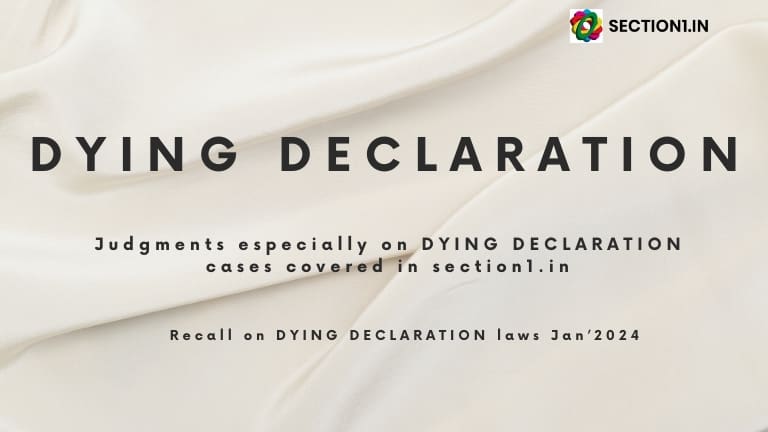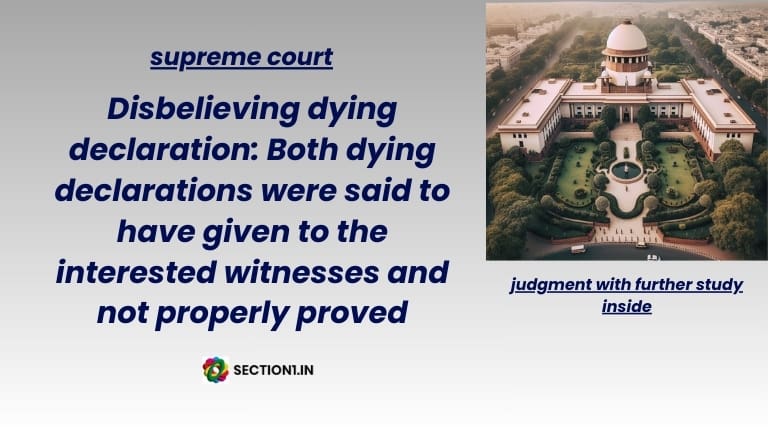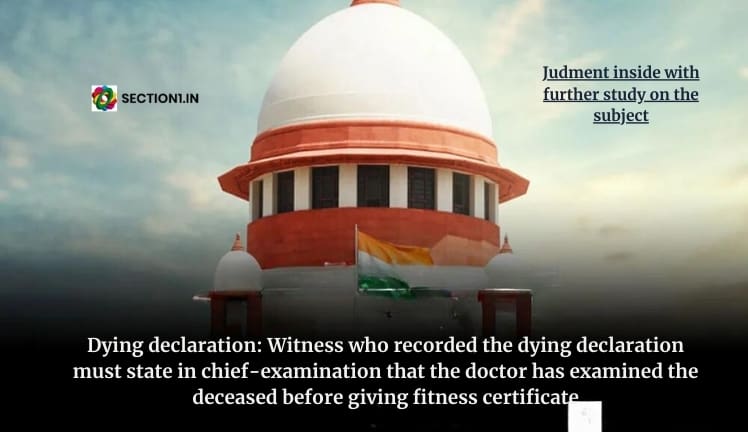Question One
6. The question that arises for consideration is whether it is tenable to uphold the conviction of the appellant solely on the basis of her purported dying declaration (Exhibit ‘P20’) which also appears to have been classified as a Statement under Section 164 of the Code of Criminal Procedure, 1973, considering that Appellant has denied making any statement?
7. In this regard, there has been a clear and consistent approach taken by this Court toward a dying declaration when the individual in question subsequently survives. In State of U.P. v. Veer Singh (2004) 10 SCC 117, it was held:
“5. It is trite law that when maker of purported dying declaration survives the same is not statement under Section 32 of the Indian Evidence Act, 1872 (for short the ‘Evidence Act’) but is a statement in terms of Section 164 of the Code. It can be used under Section 157 of the Evidence Act for the purpose of corroboration and under Section 155 for the purpose of contradiction.”
Question Two
8. There are also some decisions of this Court which cast doubt on whether such a statement can be treated as a confessional statement. We may, in this regard, rely upon two decisions, i.e., (i) “Ramprasad vs State of Maharashtra, (1999) 5 SCC 30 and (ii) “S. Arul Raja vs State of Tamil Nadu, (2010) 8 SCC 233.
9. In Ramprasad (Supra) the bar on classifying a statement as a dying declaration when the conveyer of the declaration does not succumb to his/her injuries, was detailed as follows:
“We are in full agreement with the contention of the learned counsel that Ext.52 cannot be used as evidence under Section 32 of the Evidence Act though it was recorded as a dying declaration. At the time when PW.1 gave the statement he would have been under expectation of death but that is not sufficient to wiggle it into the cassette of Section 32. As long as the maker of the statement is alive it would remain only in the realm of a statement recorded during investigation.”
Question Three
10. The Court in S. Arul Raja (Supra) then went on to address the issue of such a statement being treated as a confessional statement, by holding:
“40. This Court in the case of Sharawan Bhadaji Bhirad & Others v. State of Maharashtra reported in (2002) 10 SCC 56 held that when a statement is recorded as a dying declaration and the victim survives, such statement need not stand the strict scrutiny of a dying declaration, but may be treated as a statement under Section 164, Cr.P.C.
41. Therefore, with the said statement inadmissible as a dying declaration, the question that arises is: whether the statement could be admissible either as a confession or as an extrajudicial confession?
42. The events surrounding the confession made by A1 while in hospital, and more significantly, in police custody, are too ambiguous to support conviction of the appellant.
43. Section 164 Cr.P.C. provides guidelines to be followed for taking the statement of accused as a confession. The one essential condition is that it must be made voluntarily and not under threat or coercion. This Court in Aloke Nath Dutta & Ors. v. State of West Bengal reported in (2007) 12 SCC 230 held as under: –
“87. Confession ordinarily is admissible in evidence. It is a relevant fact. It can be acted upon. Confession may under certain circumstances and subject to law laid down by the superior judiciary from time to time form the basis for conviction. It is, however, trite that for the said purpose the court has to satisfy itself in regard to:
(i) voluntariness of the confession; (ii) truthfulness of the confession; (iii) corroboration.”
16. At this stage, it is important to understand the ambit of “reasonable doubt” in a criminal proceeding. In State of Haryana v. Bhagirath & Ors. (1999) 5 SCC 96 the difficulty in demarcating the contours of “reasonable doubt” was remarked upon:
“10. It is nearly impossible in any criminal trial to prove all elements with scientific precision. A criminal court could be convinced of the guilt only beyond the range of a reasonable doubt. Of course, the expression “reasonable doubt” is incapable of definition. Modern thinking is in favour of the view that proof beyond a reasonable doubt is the same as proof which affords moral certainty to the judge”.
11. Francis Wharton, a celebrated writer on Criminal Law in United States has quoted from judicial pronouncements in his book on “Wharton’s Criminal Evidence” as follows (at page 31, volume 1 of the 12th Edition):
It is difficult to define the phrase “reasonable doubt.” However, in all criminal cases a careful explanation of the term ought to be given. A definition often quoted or followed is that given by Chief Justice Saw in the Webster Case. He says: “It is not mere possible doubt, because everything relating to human affairs and depending upon moral evidence is open to some possible or imaginary doubt. It is that state of the case which, after the entire comparison and consideration of all the evidence, leaves the minds of the jurors in that consideration that they cannot say they feel an abiding conviction to a moral certainty of the truth of the charge.
12. In the treatise on “The Law of Criminal Evidence” authored by HC Underbill it is stated (at page 34, Volume 1 of the Fifth Edition) thus:
The doubt to be reasonable must be such a one as an honest, sensible and fair-minded man might, with reason, entertain consistent with a conscientious desire to ascertain the truth. An honestly entertained doubt of guilt is a reasonable doubt. A vague conjecture or an inference of the possibility of the innocence of the accused is not a reasonable doubt. A reasonable doubt is one which arises from a consideration of all the evidence in a fair and reasonable way. There must be a candid consideration of all the evidence and if, after this candid consideration is had by the jurors, there remains in the minds a conviction of the guilt of the accused, then there is no room for a reasonable doubt.”
PARTY: VIJAYA v. STATE REP BY THE INSPECTOR OF POLICE – Criminal Appeal No. 1573 of 2022 – SEPTEMBER 15, 2022 – [2022] 7 S.C.R. 367.
URL:Download
Files : Download






